In order to implement the Singapore Declaration on Climate Change, Energy and the Environment adopted by the 3rd East Asia Summit (EAS) in November 2007, the EAS Environment Ministers Meeting (EMM) was inaugurated in Hanoi, Viet Nam in October 2008 where ministers gave their support for a phased and prioritized approach to the implementation of the Singapore Declaration whilst agreeing that the Environmentally Sustainable Cities (ESC) agenda was an immediate priority area as an initial step for EAS environmental cooperation.
Rationale
- East Asia has undergone remarkable development through rapid industrialization, population expansion and urban growth over the years.
- The current pattern of rapid urbanization in the region is economically and environmentally unsustainable; overwhelming burdens are being placed on the environment and increasingly strained urban services, causing serious environmental degradation and leaving many to subsist in grinding poverty and abject living conditions.
- Many cities in the region, including coastal mega-cities, are especially vulnerable to the effects of climate change; particularly from sea-level rises as well as increased frequency and intensity of droughts, floods and extreme weather incidents, which necessitate initiatives to build climate resilience and adaptive capacity.
- The unmanaged expansion of cities poses a great threat to biodiversity; which must be protected to stem the degradation of natural resources and to maintain and enrich ecosystem services that support urban living.
- In order to meet the goals of the United Nations Framework Convention on Climate Change (UNFCC) and to achieve the Millennium Development Goals (MDGs), the delivery of urban environmental services, such as in transportation, waste management, energy provision and water supply, should be implemented with strategies to achieve resource-efficient, low-carbon and environmentally-sound cities.
- Thus, the formation of Environmentally Sustainable Cities (ESC) is a priority agenda in the region, which should be pursued with the collaboration of all stakeholders in an integrated manner.
- There are rich opportunities for cities of all sizes in East Asia to move towards ESC; such opportunities are present in the emerging areas of public and private investment in environmental infrastructure and services, and in the accumulated wisdom, experience and knowledge of leading environmental cities which may be harnessed and disseminated through inter-city cooperation and networks.
- Ultimately, city governments are well-poised to take the lead in pursuing ESC; taking advantage of their strategic institutional position and proximity to citizens, and are further empowered through the trend of de-centralization in environmental governance, they can reform and integrate policies and services to achieve development towards economic, social and environmental sustainability.
- There is a need to strengthen guidance, policies, regulations and other support mechanisms by national governments, as well as expand technical and financial support from the international community to realize these rich opportunities, before they are undermined by the anticipated constraints resulting from irreversible environmental destruction.
 1st HLS ESC
1st HLS ESC
To develop practical activities for collaborating on ESC, the 1st HLS ESC was held from 2 – 4 March 2010, in Jakarta Indonesia, co-organised by the Governments of Japan, Indonesia, Australia and Singapore. The result of the meeting was an agreement on 5 points of action:
1. An East Asian Model Cities initiative
2. A clearing house for ESC-related data and information
3. A Public and Private Sector Forum on ESC
4. ESC Capacity Building Programme
5. EAS ESC Awards based on performance indicators
To realise these recommendations, a proposal for initiating the ASEAN ESC Model Cities Programme as an umbrella programme implementing the 5 points was developed by the Institute for Global Environmental Strategies (IGES) and funded by the Japan-ASEAN Integration Fund (JAIF).
 2nd HLS ESC
2nd HLS ESC
With the success of the 1st seminar, the 2nd HLS ESC was organised by the Governments of Japan, Australia, Cambodia, Malaysia and Thailand on 15 – 16 March 2011 in Kitakyushu, Japan. The seminar welcomed the implementation of theASEAN ESC Model Cities Programme in April 2011, which had been designed as an umbrella initiative to realise the five recommended activities arising from the 1st HLS ESC.
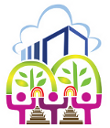 3rd HLS ESC
3rd HLS ESC
Subsequently, the 3rd HLS ESC was organised by the Governments of Cambodia, Japan, Australia, Thailand and the ASEAN Working Group on ESC (AWGESC) on 6 - 8 March 2012 in Siem Reap, Cambodia. Combined with the Regional Seminar of Year 1 of the ASEAN ESC Model Cities Programme, the seminar showcased the programme’s achievements as well as generated consensus for sustaining the HLS platform and extending the Model Cities Programme into the Year 2.
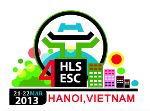 4th HLS ESC
4th HLS ESC
The 4th HLS ESC was organised by the Governments of Viet Nam, Japan, Australia, Indonesia, ASEAN Secretariat and the ASEAN Working Group on Environmentally Sustainable Cities. It continued the tradition of providing a high-level and inclusive forum to gather East Asian stakeholders for reviewing progress and discussing priority issues on sustainable urban development in the region. The seminar looked towards Year 2 of the ASEAN ESC Model Cities Programme and discussed further linkages between regional stakeholders to support ESC.
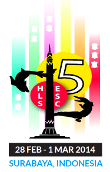 5th HLS ESC
5th HLS ESC
The 5th HLS ESC announced the extension of the ASEAN ESC Model Cities Programme into Year 2 of implementation and highlighted the latest developments in national strategies for ESC promotion ASEAN and EAS countries. Specific recommendations were made to EAS Environment Ministers on how to accelerate the ‘spread’ and ‘scale’ of good ESC practices and policies.
 6th HLS ESC
6th HLS ESC
The 6th HLS ESC disseminated the achievements of Year 2 of the ASEAN ESC Model Cities Programme as well as proposing a Draft Action Plan for an ASEAN ESC Community 2025. It was recommended that an Online Sourcebook be created under the ASEAN ESC Model Cities Programme, detailing city ESC visions, good practices and policies and requirements of assistance and interests of ASEAN Members States and cities in ESC international cooperation. Local governments were further encouraged to ‘Multi-stakeholder Mayoral Advisory ESC Committee’ (or equivalent) and an ‘International Liaison Office’ (or equivalent) and which will implement ESC projects within their cities

7th HLS ESC
The 7th HLS-ESC came to an agreement to 1. Redesign the HLS format to be a “new HLF” with the 8th HLS focuses on the achievement of the SDGs, 2. To organise the HLS as a multi-stakeholder platform for best practices in the ASEAN communities in line with the ASEAN Community Vision 2025 and the SDGs, 3. To expand its participants’ scope, and 4. To introduce a framework to accept new partnerships.
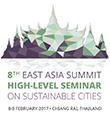
8th HLS ESC
The 8th HLS-SC was organised by the Government of Thailand, the Government of Japan, the Government of Cambodia as well as the ASEAN Working Group on Environmentally Sustainable Cities (AWGESC) and the ASEAN Secretariat. It was the first one organised to focus on the SDGs. On this occasion, the seminar was renamed to “High-level Seminar on Sustainable Cities.” It recommended that the HLS strengthen the tie between the HLS and the ASEAN ESC Model Cities Programme.

9th HLS ESC
The 9th HLS-SC was organised by the Government of Cambodia and the Government of Japan, the ASEAN Working Group on Environmentally Sustainable Cities (AWGESC) and the ASEAN Secretariat in Siem Reap, Cambodia. It recommended to the EAS Environment Ministers to support the implementation of the ASEAN SDGs FC Programme beginning in 2018 and continue its support to the HLS-SC as a platform to share and monitor progress by local governments in regards to the SDGs.
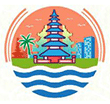
10th HLS ESC
The 9th HLS-SC was organised by the Government of Indonesia and the Government of Japan, the ASEAN Working Group on Environmentally Sustainable Cities (AWGESC) and the ASEAN Secretariat in Bali, Indonesia. The event was the first time to showcase the SDGs Frontrunner Cities, garnered attention to its progress and positive impacts. Localisation of the SDGs has become a central theme in many discussion. The participants emphasized the need of continuous support to the HLS.
